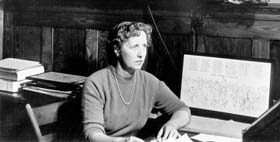
| ||
 | ||


|
 Isabel Dobell Isabel Dobell, a Member of the Order of Canada, a Fellow of the Canadian Museums Association, former chief curator and director (1968 - 1975) and curator emeritus of the McCord Museum of Canadian History, died on April 13 in her 89th year, after a long illness. Ibby Dobell was one of the great museum women of McGill, a group that included Maude Abbott, curator of the McGill Medical Museum from 1901 until shortly before her death in 1940, and Alice Johannsen, director of the Redpath Museum from 1950 to 1970. It is thanks to Dobell's vision, leadership and determination that the McCord Museum was re-opened and made available to the public, after the University had closed it in 1936. The grand-daughter of the well-known Presbyterian minister James Barclay of the Church of St. Andrew and St. Paul, Ibby Dobell was born in Montreal and educated at The Study and at McGill where she obtained her BA in 1930. One of Dobell's teachers, history professor W.T. Waugh, was struck by her energy and intellect. A member of the McGill committee that oversaw the operation of the McCord, Waugh encouraged Dobell to become involved with the museum. After graduating, she moved on to other pursuits, but the notion of working at the McCord stayed with her. In 1955, Dobell was hired as a "casual" with a monumental task -- to do an inventory of the McCord's 35,000 artifacts, then lodged in the A.A. Hodgson house (now the site of the Stewart Biology Building). The point of this lengthy and occasionally thrilling task was to make sure that the collections were still intact. It meant locating each object and ticking each entry in Mr. McCord's register with a red pencil (and occasionally adding an exasperated "What the hell is this mess?"). Each tick meant that the object had passed through her hands. There she discovered a remarkable collection and she determined to open its riches to scholars and, if possible, the general public. Ibby tells the story of her 16-year struggle to revive the museum in "Buried Treasure," in Margaret Gillett's A Fair Shake. A woman of uncompromising academic and museological standards, she began the task by educating herself. Dobell turned to Walter Stewart, owner of Macdonald Tobacco and father of her long-time friend Mrs. T.H.P. Molson, to support her in her quest. She travelled to Europe and the United States, to study and to obtain the best advice possible. With continuing support from Stewart and other patrons (Dobell was a persuasive advocate on behalf of the McCord and its collections), she began to assemble a staff with an eye towards re-opening the museum. She established a rapport with the top scholars and curators in Canadian history, decorative arts, paintings, prints and drawings, ethnology and archives. Her enthusiasm, matched by the quality of the McCord collections, inspired these experts who collaborated enthusiastically when the museum finally moved to the Union Building and plans could be made to exhibit its treasures. Ibby was equally effective as a fundraiser, a person with a vision and the ability to put it into practice -- she received funds from a variety of sources, but her most loyal benefactors were Mr. and Mrs. Walter Stewart and their daughter. A person of considerable administrative ability and exacting practicality, she prided herself on opening the McCord Museum in the black. Ibby was also able to get the best out of her staff through her ability to inspire (and sometimes drive) them with her zeal. She led by example. A gifted writer whose stories about Canadian history for children had great appeal, Ibby had the ability to reduce complicated ideas to easily accessible text. She scrutinized every word presented to the public in the museum. Above all, she possessed a profound respect for research and was convinced of its importance within the museum. "Be quiet!" she stormed at staff whose conversation was clearly audible in the library. "Don't you realize that serious research is going on in there?" She believed equally in educating her staff and sought opportunities to make it possible. She had a particular interest in the museum's costume collection and under her direction it became one of the two most important collections in the country, along with that of the Royal Ontario Museum. The McCord's costume gallery was her pride and joy. At Mrs. Dobell's funeral, I whispered to Stanley Triggs, the longtime curator of the museum's Notman Photographic Archives, "Wasn't she the best boss you ever had?" "No," he replied, "Same as..." "Same as what?" I asked, surprised. "Same as a tug boat captain I once worked for -- tough but fair." When the McCord re-opened, in March of 1971, it set the standard for exhibition and storage facilities in Canada for years. That year, the Canadian Historical Association presented her with an award of merit for her contribution to Canadian history. Throughout her career, Isabel Dobell dreamed of reviving David Ross McCord's collections to the point at which they would never be closed to the public again. The recent generous gift of the McConnell Foundation, allowing the McCord to continue to expand, is a tribute to her dream and confirmation of her vision. Isabel Dobell is survived by her daughter Judith Berlyn, three grandchildren, her son Colin Dobell and her museum. Pamela Miller,
|

|
|
| |||||